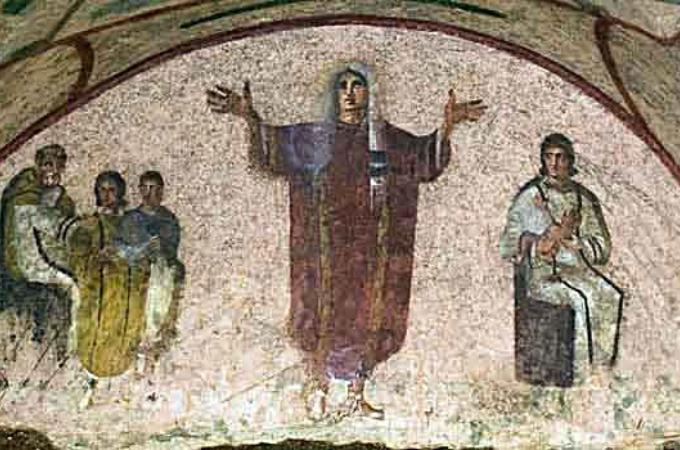'Orans' posture during Our Father
Q. A discussion that is common between the more "orthodox" members of the parish and the more "progressive" ones is whether the faithful should use the "orans" posture during the Our Father.
I remember being instructed several years ago that we were to start stretching out our hands while praying the Lord's Prayer at Mass. I felt odd doing this at first but decided that I needed to follow along as instructed.
Years later, I noticed that our nun and our deacon did not observe this. So are we supposed to stretch out our hands when offering this prayer or not? (Missouri)
A. The U.S. Conference of Catholic Bishops is quite concise on the issue, saying in its guidelines that "no position is prescribed in the Roman Missal for an assembly gesture during the Lord's Prayer." There is simply no "rule" or guideline.
As you say, though, it has become common in some congregations for the faithful to adopt the "orans" posture -- with hands extended to the side and facing up or out. The priest, by contrast, is directed specifically in the rubrics to adopt the "orans" posture during the Our Father.
Some liturgists have pointed to this as a bit of an anomaly: Generally, the celebrant extends his hands during the parts of the Mass when he is praying aloud and alone, on behalf of the congregation; during the Our Father, he is praying not on behalf of the congregation but along with them -- as in the Gloria and the creed, when his hands are joined.
Perhaps future liturgical guidelines will clarify this; in the meanwhile, though, I can't imagine that it matters a lot to God.
Q. I have long been a fan of the television series "M.A.S.H." that takes place during the Korean conflict. In a couple of the episodes, the priest on the show is asked by a soldier if he can perform a Methodist, a Jewish or a Presbyterian service for him.
In each case, the priest answers that he is allowed to perform services for all denominations. From what I gather, this type of service was also offered during World War II as well.
My question is this: Were ministers of all faiths permitted to say Mass, distribute Communion and hear confessions of Catholic servicemen during those battlefield and hospital-stay conditions? (Woodbury, Minnesota)
A. In wartime situations, it has always been common to have interfaith services offered by chaplains of various religious denominations.
Needless to say, not every religion can supply a member of the clergy for every military outpost; so regularly, for centuries, clergy have presided at services -- open to members of all religions or of none -- consisting of scriptural readings, "sermonettes," words of spiritual comfort and prayers of blessing.
To your specific question, though, ministers of other faiths have never been permitted to celebrate Mass or hear the confessions of Catholic servicemen and women. The church's Code of Canon Law (No. 900.1) explains that "the minister who is able to confect the sacrament of the Eucharist in the person of Christ is a validly ordained priest alone."
Likewise, another provision (No. 965) notes that "a priest alone is the minister of the sacrament of penance," and Canon 1003 stipulates that "every priest and a priest alone validly administers the anointing of the sick."
Of course -- and this happens regularly -- clergy of any faith may offer prayers of blessing and words of comfort over a sick or dying Catholic, but they may not absolve or anoint.
An exception to this sacramental strictness comes with baptism: Canon 861.2 provides that "in a case of necessity any person with the right intention" may confer the sacrament of baptism licitly.
So if a serviceman dying on the battlefield wanted to be baptized a Catholic, a member of the clergy of any denomination (or a layperson, for that matter) could do so by pouring the water and saying the words of baptism.
- Father Kenneth Doyle is a columnist for Catholic News Service



















